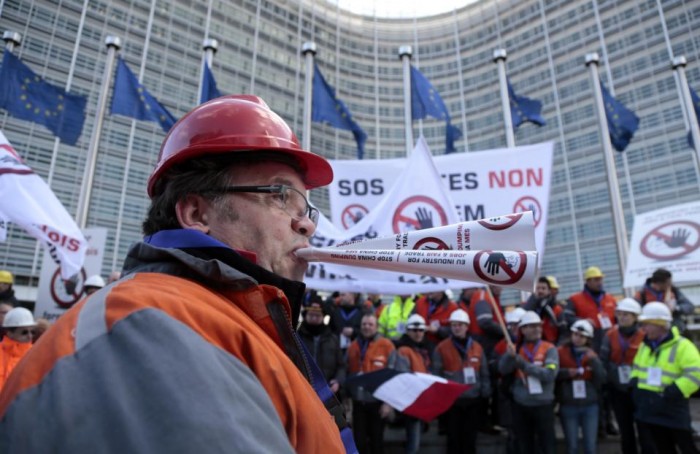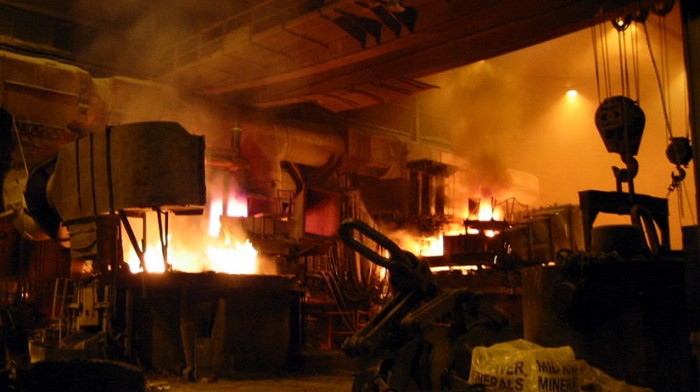
A steelworkers blows a paper horn during a demonstration of steelworkers in the European quarter of Brussels on Monday, Feb. 15, 2016. Thousands of steel workers from across the European Union demonstrated against the import of cheap Chinese products and warned EU leaders not to acerbate the situation by granting Beijing market economy status. (AP Photo/Virginia Mayo)
Credit: news.yahoo.com
The European Commission has launched a new series of anti-dumping investigations on the imports of three steel products, seamless pipes, heavy plates and hot-rolled flat steel, from China. In addition, the Commission decided to impose anti-dumping duties on cold-rolled flat steel from China and Russia, ranging between 13.8 percent and 16 percent for the Chinese companies and between 19.8 percent and 26.2 percent for the Russian ones. However, Geert Van Poelvoorde, president of European Steel Association (Eurofer), said these duties are too low, as the level of dumping is 60 percent. Eurofer represents more than 25% of the total EU production of rebars.
The decisions of such investigations and duties on China and Russia are the response to the requests from seven ministers from Germany, Italy, the UK, France, Poland, Belgium and Luxembourg together with the support from the industry. The member states and the industry have expressed their anxiety on the cheap Chinese steel which is sold under market price. It harmed the European steel industry and resulted in a job cut and huge loss to the producers. Tata Steel last month claimed another 1,050 jobs would go from its UK operations, adding to the 1,200 jobs axed by the Indian-owned giant last October and the 720 jobs it cut in July. The Luxembourg-based steel giant ArcelorMittal criticized the importation of cheap Chinese steel for its $8bn loss last year.
“China is financing overcapacity, which leads to overproduction, which leads to selling below reasonable prices, below the cost of production. Nobody can compete with that,” said Milan Nitzschke, spokesperson for of about 30 European industrial sectors.
On the other hand, European Steel Association (Eurofer) echoed Aegis European alliance in their recent statement welcoming the Commission’s new investigation and imposition of duties. The association agreed that overproduction of steel in China exceeded the local consumption which therefore led to exportation to overseas in a below-market price.
It is believed that the overproduction of steel is a result of the Chinese government stimulus policies to boost the economic growth in order to maintain the full-year GDP growth target of “around 7%”.
After joining the WTO since 2001, China can be treated as a non-market economy in anti-dumping proceedings under section 15 of the China WTO Accession Protocol. It means that the European Commission can use non-market economy methodology to determine the normal value of the good. Under this methodology, higher anti-dumping duties would be levied. In addition to the EU, the main countries which still consider China an non-market economy are the US, Canada, Japan, Mexico and India. However, this section 15 will expire after 11 December 2016. Therefore, Beijing is urging the European Commission to grant China a market economy status (MES).
European industries concerned that if China is granted with a market economy status, the duties and the normal value of Chinese steel will be even lower than the current price without the existing stricter calculation. It will further endanger the whole industry in Europe.
The commission argues that granting MES and anti-dumping investigations against China are “completely unrelated” issues. EU Trade Commissioner Cecilia Malmström said: “ I am determined to use all means possible to ensure that our trading partners play by the rules. We have so far put in place trade defence measures for more than 30 different types of steel products, and we will continue to effectively address legitimate concerns of our industry.” The EU now has 37 trade defense measures in place on imports of steel products, while nine investigations are still ongoing.
歐盟委員會就由中國進口的三種鋼鐵產品包括無縫鋼管、厚鋼板、熱軋扁鋼,進行新一輪的反傾銷調查。此外,委員會決定對來自中國和俄羅斯的冷軋扁鋼徵收反傾銷稅,由中國進口的需繳付13.8%至16%的稅率;而由俄羅斯進口的則需付19.8%至26.2%的稅率。然而,歐洲鋼鐵協會會長Geert Van Poelvoorde指出,這些反傾銷稅率太低,因為傾銷至歐洲的鋼鐵產品達到市場上的60%。歐洲鋼鐵協會代表超過歐盟鋼筋總生產量的25%以上。
歐盟回應了由七位來自德國、意大利、英國、法國、波蘭、比利時和盧森堡部長的要求,作出對中國和俄羅斯的調查和新關稅決定,這些要求亦得到了鋼鐵行業的支持。該七個會員國和業內人士表達了他們對低於市場價格出售的廉價中國鋼材產生焦慮。它傷害了歐洲鋼鐵工業和導致了裁員和巨大的營業損失。Tata Steel公司上個月宣稱將其英國業務中減少1050個職位,該印度國有巨頭分別在去年十月和七月裁減了1200個及720個職位。部位於盧森堡的鋼鐵巨頭ArcelorMittal則批評進口的廉價中國鋼材使其公司去年虧損80億美元。
Aegis European alliance ,發言人Milan Nitzschke指出,“中國正資助產能過剩,從而導致生產過剩,使售價低於合理價格及低於生產成本。沒有人能與中國競爭。“ Aegis European alliance代表約30項歐洲工業。
另一方面,歐洲鋼鐵協會在其最近的聲明附和Aegis European alliance,並歡迎委員會的新調查及徵收關稅。歐洲鋼鐵協會認同中國鋼鐵生產過剩超過了當地的消費能力,因此導致了以一個低於市場的價格出口到海外。
有理由相信,中國政府的刺激經濟政策引致鋼鐵產品生產過剩,一系列的刺激經濟政策希望加速經濟增長,並使中國的全年GDP增長目標維持在“7%左右” 。
中國自2001年加入世界貿易組織後,根據中國入世議定書第15條,中國在反傾銷訴訟中可以被視為非市場經濟國家。歐盟委員會可以使用非市場經濟方法來確定商品的正常價值。根據這計算方法,歐盟將會徵收更高的反傾銷稅。除了歐盟外,主要國家包括美國、加拿大、日本、墨西哥和印度仍視中國為非市場經濟。然而,此15條將於2016年12月11後到期。因此,北京正催促歐盟委員會屆時給予中國市場經濟地位。
歐洲業界擔心,如果中國被授予市場經濟地位,在缺乏現有的嚴格計算方法下,中國鋼鐵產品的正常價值及其稅項將更低於目前的價格,這將進一步危及整個歐洲行業。
歐盟委員會認為,對中國給予市場經濟地位和反傾銷調查是“完全不相關”的。歐盟貿易專員Cecilia Malmström 說,「我決心利用一切可能的手段,以確保我們的貿易夥伴按規則辦事,我們已對30多個不同類型的鋼材產品制定貿易防禦措施。 我們繼續有效地解決我們行業的合理關注。」歐盟目前在對鋼鐵產品進口實施三十七項貿易保護措施,而同時對九個項目進行調查。
Endnotes:
- European Commission – Press release Commission launches new anti-dumping investigations into several steel products
http://europa.eu/rapid/press-release_IP-16-287_en.htm
- EUROFER – EUROFER welcomes EU anti-dumping measures against imports of stainless steel cold rolled flat products (SSCR) from China and Taiwan
http://www.eurofer.org/News%26Media/Press%20releases/EUROFER%20welcomes%20EU%20AD%20measure.fhtml
- EUObserver- Thousands protest Chinese steel dumping, urge EU to act
https://euobserver.com/eu-china/132268
- The Wall Street Journal – China’s Steel Industry Still Overproducing
http://blogs.wsj.com/economics/2014/07/16/chinas-steel-industry-still-overproducing/
- BBC- Steel imports from China investigated by European Commission
http://www.bbc.com/news/business-35559540
- European Parliament – Granting Market Economy Status to China An analysis of WTO law and of selected WTO members’ policy
http://www.europarl.europa.eu/RegData/etudes/IDAN/2015/571325/EPRS_IDA(2015)571325_EN.pdf


